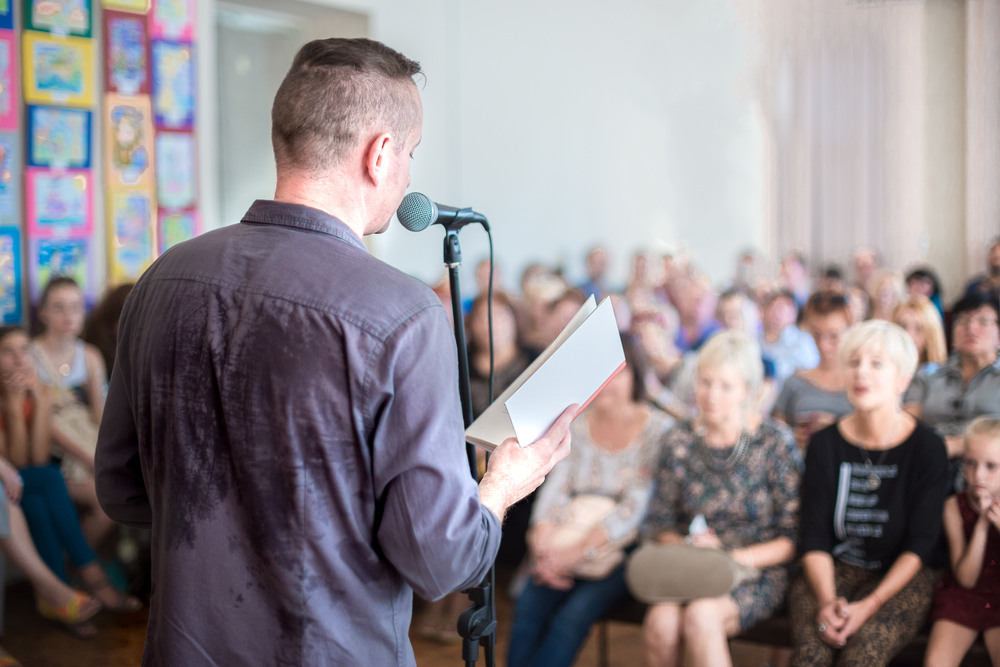How to do a Book Reading
A crowd of avid readers shuffle into the conference room, talking in hushed tones. You peak out behind the curtain from the stage and see some have a copy of your book tucked between their arms. You smile to yourself, as you see others walk in wearing curious expressions. They glance at their programs, reading your bio and nodding to themselves. You’re sweating now, the pressure to impress is getting to you. You spend your days behind a computer screen, crafting stories and chronicling the lives of fictional people- and now, you have to stand on stage in front of a live audience. For most writers, doing a book reading is out of your comfort zone (and that’s putting it mildly). Here’s how to not only ‘get through’ a book reading, but have it be successful and fun.

1) Keep it short and sweet
No matter how enthusiastic your fans are, typical book-reading audiences will start to tune out after 8-10 minutes of uninterrupted speech. Try to keep your reading around that time length so that you don’t end up losing the interest of your audience. The goal is to leave the reading with your audience wanting more, not having them leave feeling like they got way too much. Plus, the longer you drone on after your audience has lost interest, the more you look like you just enjoy hearing yourself talk (and that doesn’t bode well for book sales).
2) Choose the right passage
In addition to timing your book reading correctly, you’ll need to select the perfect passage to read from. This could be the beginning of your book, but it could also take place somewhere in the middle as well. Choosing a portion of your book for a book reading is a very difficult art. You want to choose a part that is heavier in action than exposition because that will hold the listener’s interest more, but you also don’t want to choose any parts with major spoilers because that may dissuade the audience members from purchasing your book post-reading. While attempting to avoid that faux pas, try to choose a part that feels as though it has a beginning, middle, and end within your story. Something that has action, good prose, a little bit of a character arc, and perhaps ends on a juicy cliffhanger to leave your listeners wanting more.

3) Practice & Prepare
A lot of authors approach book readings without much prep work other than choosing a passage. They think ‘Well, I can read so…’ and then they don’t prepare whatsoever. But you’d be surprised at the unexpected nerves that set in and the stuttering that can come from simply being out of practice at reading in a public setting. It’s crucial that authors practice reading their passage repetitively, alone and in front of family/friends, to get their rhythm down and help eliminate some of the hiccups that can occur in a reading.
Not only should you practice though, you’ll also need to be fully prepared for the reading. Call the venue and have them walk you through the activities of the day- Are they doing a Q&A after the reading? Are they doing a signing or meet & greet after the reading? Obviously, in the case of the latter, you’d need to come prepared with books and pens to sign copies and/or sell copies.
4) Be positive & humble
Nothing will put an audience off quicker than you coming out on stage with an arrogant attitude, acting like your words are prophetic. No matter what level of success you’ve attained with your work, readers want their authors to be humble and kind. And, if you’re looking to build up success, having humility will allow you to build good relationships where readers are rooting for you to succeed. These are the kind of supportive readers that will pass along recommendations to their friends, post about you on their social platforms, etc. because they genuinely want to support you.
In addition, you must have a positive attitude. Even if you are a huge introvert and doing book readings are the bain of your existence, your audience doesn’t want to hear that (even if you say it as a joke). They’re excited to see you in this platform, they don’t want to hear you complain about how much you hate it- this will put a damper on the whole event.

5) Be concise when answering questions
Doing a Q&A can be a fun way for readers to get to know you on a more personal level. If every answer you give is super long-winded, however, they’ll wish they never did. Not only will readers become discouraged from asking questions if every answer is ten minutes long, but time may run out without you getting to every question. If you think you’ll struggle giving short concise answers to questions, do some research beforehand. Look up some common questions at book readings and watch some youtube videos as well. Write down some of the most repeated questions and come up with concise answers that you’re also satisfied with.
6) Network & Promote Yourself
As we stated previously, a book reading is an amazing opportunity to establish personal relationships with some of your readers. Don’t be afraid to mingle during the signing portion or even after the event is over. These types of relationships are the ones that really work hard to help build up your career.
If you’re attempting to establish a social media presence for yourself as an author, it would be helpful to bring along a friend or fellow author to take videos and photos of the event. Doing a book reading establishes legitimacy for you as an author and that is great content to help build up your author pages.
